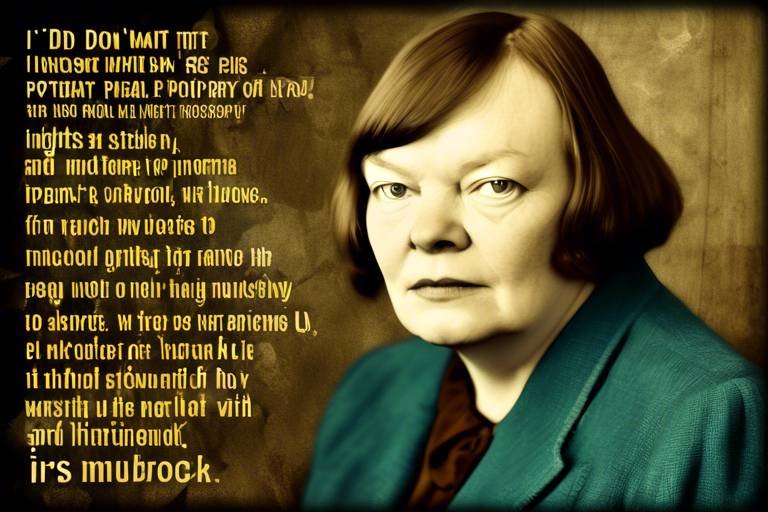The Philosophy of Thomas Aquinas - Blending Faith and Reason
Thomas Aquinas, a towering figure in the world of philosophy and theology, has left an indelible mark on how we understand the relationship between faith and reason. Born in 1225 in Italy, Aquinas was not only a philosopher but also a theologian, and his work sought to harmonize the teachings of the Church with the philosophical ideas of his time, particularly those of Aristotle. His approach was revolutionary, as he believed that faith and reason are not mutually exclusive but rather complementary paths that lead to the same ultimate truth. This synthesis of thought has influenced countless scholars and thinkers throughout the centuries, making Aquinas a central figure in the development of Western philosophy.
Aquinas's philosophy is characterized by a profound respect for human reason while simultaneously upholding the significance of divine revelation. He argued that while reason can lead us to many truths about the world and our existence, there are certain mysteries of faith that can only be grasped through divine grace. This belief is encapsulated in his famous assertion that "grace does not destroy nature, but perfects it." In other words, Aquinas saw the natural world and human intellect as essential tools that could be used to explore deeper theological truths.
The impact of Aquinas's work extends far beyond the confines of medieval philosophy. His ideas laid the groundwork for the development of scholasticism, a method of learning that emphasizes critical analysis and systematic exposition of theological and philosophical concepts. This method became the dominant form of education in European universities for centuries. Aquinas's influence can be seen in various fields, including ethics, metaphysics, and even political theory, as his thoughts on natural law and morality continue to resonate in contemporary discussions.
In this article, we will delve deeper into the life of Thomas Aquinas, explore his major works, and examine the intricate balance he maintained between faith and reason. We will also discuss his lasting influence on Western thought and how his ideas remain relevant today. So, buckle up as we embark on this intellectual journey through the mind of one of history's greatest thinkers!
An overview of Aquinas's life, including his background, education, and the influences that shaped his philosophical and theological perspectives.
A discussion of Aquinas's key writings, such as the Summa Theologica and Summa Contra Gentiles, and their significance in the realm of philosophy and theology.
An exploration of the structure and main themes of the Summa Theologica, emphasizing its role in articulating Aquinas's thoughts on God, morality, and human nature.
A detailed look at the pivotal arguments presented in the Summa Theologica, including the Five Ways to prove God's existence.
An examination of Aquinas's ethical framework, including his views on virtue, natural law, and the ultimate purpose of human life.
An analysis of the Summa Contra Gentiles, focusing on Aquinas's arguments against non-Christian philosophies and his defense of the Christian faith.
A discussion on how Aquinas reconciled faith and reason, illustrating his belief that both can coexist and complement each other in the pursuit of truth.
An exploration of natural theology in Aquinas's philosophy, highlighting his arguments for understanding God through reason and observation of the natural world.
A look at Aquinas's views on the supernatural elements of faith, including divine revelation and the role of grace in understanding theological truths.
An overview of Aquinas's lasting impact on Western philosophy, theology, and the development of scholasticism, as well as his relevance in contemporary discussions.
- Who was Thomas Aquinas? - Thomas Aquinas was a 13th-century philosopher and theologian known for his synthesis of faith and reason.
- What are Aquinas's major works? - His major works include the Summa Theologica and Summa Contra Gentiles.
- How did Aquinas influence philosophy? - Aquinas's thoughts laid the groundwork for scholasticism and have influenced ethics, metaphysics, and theology.
- What is the relationship between faith and reason in Aquinas's philosophy? - Aquinas believed that faith and reason are complementary and can coexist in the pursuit of truth.

The Life of Thomas Aquinas
Thomas Aquinas was born in 1225 in the castle of Roccasecca, located in the Kingdom of Sicily. He hailed from a noble family, which provided him with a privileged upbringing. His early education began at the Benedictine monastery of Monte Cassino, where he was introduced to the classical texts that would later shape his philosophical inquiries. Imagine a young boy, surrounded by the echoes of ancient thinkers, absorbing the wisdom of Aristotle and the early Church Fathers. This environment sparked a profound curiosity in him, leading him to pursue a deeper understanding of faith and reason.
At the age of 19, Aquinas made a bold decision that would define his life's work. He joined the Order of Preachers, commonly known as the Dominicans, against his family's wishes. This choice was not merely a career move; it was a calling. The Dominicans emphasized education and preaching, which aligned perfectly with Aquinas's intellectual aspirations. His time with the Dominicans allowed him to engage with a community dedicated to both scholarship and the dissemination of Christian doctrine.
Aquinas's education continued at the University of Naples, where he studied under prominent scholars of the time. He was deeply influenced by the works of Aristotle, which were being reintroduced to the Western world through translations from Arabic. This exposure to Aristotelian thought played a crucial role in shaping his philosophical framework. Aquinas believed that reason and faith could coexist harmoniously, a revolutionary idea for his time.
Throughout his life, Aquinas traveled extensively, engaging with various intellectual circles. He studied in Paris, where he earned his master's degree in theology. Paris was a melting pot of ideas, and Aquinas thrived in this environment, debating and refining his thoughts with contemporaries. His ability to synthesize different philosophical traditions made him a pivotal figure in the development of scholasticism, a method of critical thought that dominated medieval universities.
Despite facing opposition from various factions within the Church and academia, Aquinas remained steadfast in his beliefs. His works, particularly the Summa Theologica and the Summa Contra Gentiles, reflect his commitment to merging faith and reason. Aquinas passed away in 1274, but his legacy endures. He was canonized by Pope John XXII in 1323 and declared a Doctor of the Church, solidifying his influence on Christian theology and Western philosophy.
In summary, Thomas Aquinas's life was a remarkable journey of intellectual pursuit and spiritual dedication. His ability to navigate the complexities of faith and reason has left an indelible mark on philosophy and theology. Understanding his life helps us appreciate the profound impact he had on shaping the discourse around these essential themes.

Aquinas's Major Works
Thomas Aquinas, a towering figure in medieval philosophy, left behind a rich legacy of writings that continue to resonate through the ages. His major works, notably the Summa Theologica and the Summa Contra Gentiles, serve as monumental texts in both philosophy and theology. These works are not just collections of ideas; they are intricate systems of thought that reflect Aquinas's profound understanding of the relationship between faith and reason.
The Summa Theologica, perhaps Aquinas's most famous work, is structured as a comprehensive guide to Christian theology. This text is divided into three main parts: the first part deals with God and His creation, the second part addresses human action and morality, while the third part focuses on Christ and the sacraments. Each section is meticulously crafted, leading the reader through a logical progression of ideas. Aquinas’s methodical approach allows individuals to grapple with complex theological concepts, making them accessible to both scholars and laypersons alike.
In contrast, the Summa Contra Gentiles serves a different purpose. Written as a defense of the Christian faith against non-Christian philosophies, this work articulates Aquinas's arguments in favor of the existence of God and the truth of Christian doctrine. It is particularly notable for its apologetic nature, addressing potential objections from various philosophical traditions. In this text, Aquinas demonstrates his ability to engage with opposing viewpoints, showcasing his belief that reason can indeed support faith.
To better understand the significance of these works, let’s take a closer look at their main themes and contributions:
| Work | Main Themes | Significance |
|---|---|---|
| Summa Theologica |
|
Foundation for Catholic theology and moral philosophy |
| Summa Contra Gentiles |
|
Critical for apologetics and interfaith dialogue |
Both works exemplify Aquinas's unique ability to blend philosophical reasoning with theological insight. He believed that faith and reason are not mutually exclusive; rather, they complement each other in the quest for truth. This perspective is particularly evident in the Summa Theologica, where Aquinas meticulously outlines arguments that are both rational and deeply rooted in faith.
Moreover, Aquinas's writings have had a lasting impact on Western thought. His systematic approach to theology has influenced countless scholars and theologians throughout history. The clarity and depth of his arguments continue to be a source of inspiration for those exploring the intersections of faith, philosophy, and ethics. In our contemporary world, where faith and reason often seem at odds, Aquinas's works remind us of the powerful synergy that can exist between the two.
In conclusion, Thomas Aquinas's major works are not only cornerstones of Christian philosophy but also vital contributions to the broader discourse on the nature of truth. By engaging with his texts, readers can embark on a journey that challenges them to reflect on their own beliefs and the foundations of their understanding.
1. What is the main purpose of the Summa Theologica?
The Summa Theologica aims to provide a comprehensive explanation of Christian theology, addressing questions about God, morality, and the nature of humanity.
2. How does the Summa Contra Gentiles differ from the Summa Theologica?
While the Summa Theologica is primarily a theological treatise, the Summa Contra Gentiles serves as an apologetic work that defends the Christian faith against non-Christian philosophies.
3. Why are Aquinas's works still relevant today?
Aquinas's works remain relevant as they explore fundamental questions about existence, morality, and the relationship between faith and reason, which continue to be pertinent in contemporary philosophical and theological discussions.

Summa Theologica
The is often regarded as the crowning achievement of Thomas Aquinas's philosophical and theological work. Written between 1265 and 1274, this monumental text aims to provide a comprehensive guide to Christian theology, blending intricate philosophical arguments with deep spiritual insights. Imagine it as a vast ocean of knowledge, where each wave represents a different aspect of faith, reason, and morality, crashing together to form a harmonious understanding of God and human existence.
What makes the particularly captivating is its structured approach. Aquinas organizes the text into three main parts, each delving into fundamental questions about God, humanity, and the moral order of the universe. The first part addresses the nature of God, exploring attributes such as His existence, goodness, and the Trinity. The second part dives into human nature, discussing the role of free will, virtues, and the moral law. Finally, the third part examines Christ's role in salvation and the sacraments, tying everything back to the divine.
One of the most intriguing aspects of the is its use of a dialectical method. Aquinas poses a series of questions, often presenting opposing views before systematically dismantling them with logical arguments. This approach not only showcases his mastery of philosophical reasoning but also invites readers to engage critically with the material. It's akin to a friendly debate, where Aquinas plays both sides, ultimately guiding his audience towards a deeper understanding of the truth.
To illustrate the significance of the , let’s take a closer look at some of its key themes:
- The Existence of God: Aquinas famously presents his Five Ways to demonstrate God's existence, each rooted in observation and logical reasoning.
- Human Nature and Morality: He emphasizes the importance of virtue ethics, arguing that true happiness is found in living a virtuous life aligned with natural law.
- Divine Revelation: While reason plays a crucial role, Aquinas also acknowledges the necessity of faith and divine revelation for understanding deeper truths.
In essence, the serves as a bridge between faith and reason, illustrating Aquinas's belief that both are essential in the pursuit of knowledge and truth. It’s not just a theological treatise; it’s a profound exploration of the human condition, inviting readers to ponder life's most pressing questions. Whether you’re a seasoned theologian or a curious seeker, the offers insights that resonate across centuries, making it a timeless work in the landscape of Western thought.
What is the main purpose of the Summa Theologica?
The main purpose of the is to provide a comprehensive synthesis of Christian theology, addressing fundamental questions about God, humanity, and morality.
How is the Summa Theologica structured?
The is structured into three main parts: the first part focuses on God, the second on humanity and morality, and the third on Christ and salvation.
Why is the dialectical method important in Aquinas's writing?
The dialectical method allows Aquinas to present opposing views and systematically refute them, encouraging critical engagement with the material and leading readers towards a deeper understanding of truth.

and
This article explores the profound philosophical contributions of Thomas Aquinas, highlighting his synthesis of faith and reason and its impact on theology, ethics, and metaphysics.
An overview of Aquinas's life, including his background, education, and the influences that shaped his philosophical and theological perspectives.
A discussion of Aquinas's key writings, such as the Summa Theologica and Summa Contra Gentiles, and their significance in the realm of philosophy and theology.
An exploration of the structure and main themes of the Summa Theologica, emphasizing its role in articulating Aquinas's thoughts on God, morality, and human nature.
A detailed look at the pivotal arguments presented in the Summa Theologica, including the Five Ways to prove God's existence.
An examination of Aquinas's ethical framework, including his views on virtue, natural law, and the ultimate purpose of human life.
An analysis of the Summa Contra Gentiles, focusing on Aquinas's arguments against non-Christian philosophies and his defense of the Christian faith.
A discussion on how Aquinas reconciled faith and reason, illustrating his belief that both can coexist and complement each other in the pursuit of truth.
An exploration of natural theology in Aquinas's philosophy, highlighting his arguments for understanding God through reason and observation of the natural world.
A look at Aquinas's views on the supernatural elements of faith, including divine revelation and the role of grace in understanding theological truths.
An overview of Aquinas's lasting impact on Western philosophy, theology, and the development of scholasticism, as well as his relevance in contemporary discussions.
- Who was Thomas Aquinas?
Aquinas was a medieval philosopher and theologian known for his synthesis of Aristotelian philosophy with Christian doctrine. - What is the main idea of Aquinas's philosophy?
Aquinas believed in the harmony of faith and reason, asserting that both are essential in understanding truth. - What are the Five Ways?
The Five Ways are five arguments presented by Aquinas to demonstrate the existence of God based on observation and reason. - How did Aquinas influence modern philosophy?
Aquinas's work laid the groundwork for much of Western thought, influencing both religious and secular philosophy.

Summa Contra Gentiles,
The Summa Contra Gentiles is one of Thomas Aquinas's most significant works, crafted as a response to the challenges posed by non-Christian philosophies. Written in a systematic and logical manner, this text serves as a robust defense of the Christian faith against the backdrop of various philosophical arguments. What makes this work particularly fascinating is Aquinas's ability to engage with different belief systems while maintaining a clear articulation of Christian doctrine. This approach not only showcases his profound understanding of both faith and reason but also highlights his commitment to dialogue and intellectual engagement.
In the Summa Contra Gentiles, Aquinas divides his arguments into four main sections, each addressing different aspects of theology and philosophy. The first section focuses on the existence of God, where Aquinas employs logical reasoning to argue for the necessity of a first cause. He posits that everything in the universe has a cause, and if we trace these causes back, we must arrive at an uncaused cause—God. This argument is crucial because it lays the groundwork for understanding divine existence from a rational perspective.
The second section delves into the nature of God, where Aquinas discusses attributes such as omnipotence, omniscience, and benevolence. He emphasizes that understanding God's nature is essential for grasping the essence of Christian faith. Aquinas's method of using philosophical reasoning to explain God's characteristics is a testament to his belief that faith and reason are not mutually exclusive but rather complementary.
Next, the third section tackles the relationship between God and creation. Here, Aquinas articulates the idea of divine providence, asserting that God not only created the world but also continues to sustain it. This concept invites readers to reflect on the significance of divine intervention in human affairs, suggesting that God’s involvement is both purposeful and benevolent.
Finally, the fourth section addresses the moral implications of Aquinas's theological arguments. He argues that understanding God's nature and existence leads to a clearer comprehension of morality and ethics. By grounding morality in the divine, Aquinas provides a framework that transcends cultural and philosophical boundaries, making a compelling case for the universality of Christian ethical teachings.
To summarize, the Summa Contra Gentiles is not just a defense of Christianity; it is a profound exploration of the interplay between faith and reason. Aquinas's ability to engage with the philosophical ideas of his time while remaining steadfast in his beliefs illustrates his unique position in the history of thought. His work continues to resonate today, inviting both believers and skeptics to engage in a deeper understanding of faith, ethics, and the nature of reality.
- What is the main purpose of the Summa Contra Gentiles?
The main purpose is to defend the Christian faith against non-Christian philosophies, using reason and logic to articulate theological truths.
- How does Aquinas argue for the existence of God in this work?
Aquinas presents logical arguments, particularly the concept of a first cause, to demonstrate the necessity of God's existence.
- What are the key themes addressed in the Summa Contra Gentiles?
The key themes include the existence and nature of God, divine providence, and the relationship between faith and morality.
- Why is the Summa Contra Gentiles significant in philosophy?
It is significant because it represents a systematic approach to theology that integrates philosophical reasoning, influencing both religious and secular thought.

and their significance in the realm of philosophy and theology.
Thomas Aquinas was born in 1225 in the Kingdom of Sicily, a place teeming with intellectual and cultural diversity. Coming from a noble family, he was destined for a life of privilege. However, his passion for knowledge led him to join the Order of Preachers, commonly known as the Dominicans. His education took him to prestigious institutions, where he was influenced by the works of Aristotle and the emerging scholastic tradition. This blend of backgrounds and education shaped Aquinas into one of the most influential philosophers and theologians in history.
Aquinas's contributions to philosophy and theology are monumental, with his key writings serving as foundational texts in these fields. His most notable works, Summa Theologica and Summa Contra Gentiles, delve into complex questions about existence, morality, and the nature of God. These texts are not merely academic; they are dialogues that invite readers to explore profound truths. Aquinas’s ability to synthesize faith and reason has made these works significant in the realm of philosophy and theology.
The Summa Theologica is structured as a comprehensive guide to the Christian faith, addressing questions about God, morality, and human nature. It is divided into three main parts: the existence and nature of God, the moral life of humans, and the sacraments. This structure allows Aquinas to systematically present his arguments, making complex theological concepts accessible. The work is characterized by its methodical approach, where Aquinas presents objections to his views before offering his responses, showcasing his deep understanding of opposing perspectives.
Among the pivotal arguments in the Summa Theologica are the Five Ways to prove God's existence. These arguments are:
- The Argument from Motion: Everything that is in motion must be moved by something else.
- The Argument from Causation: Every effect has a cause, leading to a First Cause, which is God.
- The Argument from Contingency: Since things in the universe come into and out of existence, there must be a necessary being that causes existence.
- The Argument from Degree: There are varying degrees of goodness, truth, and nobility, which implies the existence of a perfect being.
- The Teleological Argument: The order and purpose in the world suggest a designer.
These arguments not only defend the existence of God but also lay the groundwork for subsequent philosophical discourse.
Aquinas's ethical framework is deeply rooted in his understanding of virtue and natural law. He posits that humans are naturally inclined to seek good and avoid evil. This pursuit of good is guided by reason, which helps individuals understand moral truths. Aquinas emphasizes the importance of virtue as a habit that enables individuals to act rightly. His concept of natural law suggests that moral principles are inherent in human nature and can be discovered through reason, bridging the gap between faith and rational thought.
The Summa Contra Gentiles serves as Aquinas's defense of the Christian faith against non-Christian philosophies. In this work, he addresses the beliefs of various thinkers and religions, articulating the rational foundations of Christianity. Aquinas argues that faith and reason are not adversaries but allies in the quest for truth, providing a robust framework for understanding the divine. This text is essential for anyone interested in the interplay between faith and philosophy.
Aquinas's philosophy is a remarkable exploration of how faith and reason can coexist harmoniously. He believed that while faith provides insights into divine truths, reason is crucial for understanding and articulating those truths. This dual approach allows for a comprehensive understanding of reality, where both spiritual and rational dimensions are considered. Aquinas’s thoughts encourage individuals to embrace both faith and reason, fostering a deeper understanding of their beliefs.
Natural theology plays a significant role in Aquinas's philosophy. He asserts that through reason and observation of the natural world, one can gain insights about God. This approach is akin to looking at a beautiful painting and inferring the skill of the artist. Just as the painting reveals the artist’s creativity, the world offers clues about the Creator. Aquinas’s arguments for natural theology highlight the importance of rational inquiry in understanding the divine.
While Aquinas champions reason, he also acknowledges the supernatural aspects of faith. He argues that divine revelation and grace are essential for understanding theological truths that surpass human comprehension. Faith, in Aquinas's view, is not blind; rather, it is illuminated by divine grace, allowing believers to grasp profound mysteries. This interplay between faith and reason enriches the believer's journey, making it not only a quest for knowledge but also a deeply spiritual experience.
The influence of Aquinas on Western philosophy is undeniable. His works laid the groundwork for the development of scholasticism and continue to resonate in contemporary philosophical discussions. His ability to blend faith and reason has inspired countless thinkers, making him a pivotal figure in both theology and philosophy. Today, Aquinas's insights remain relevant as we navigate complex moral and existential questions, reminding us of the enduring power of his thought.
1. What is the main contribution of Thomas Aquinas to philosophy?
Aquinas is known for synthesizing faith and reason, particularly through his works like the Summa Theologica, which addresses fundamental questions about God and morality.
2. How does Aquinas view the relationship between faith and reason?
Aquinas believes that faith and reason are complementary; faith provides divine truths while reason helps in understanding and articulating those truths.
3. What are the Five Ways of Aquinas?
The Five Ways are arguments presented by Aquinas to prove the existence of God, including the arguments from motion, causation, contingency, degree, and design.
4. Why is Aquinas considered a key figure in Western philosophy?
His integration of Aristotelian philosophy with Christian theology laid the foundation for scholasticism and influenced subsequent philosophical thought.

The Summa Theologica
The Summa Theologica, often regarded as Thomas Aquinas's magnum opus, is a monumental work that seeks to systematically present the Christian faith in a way that is both logical and accessible. Written in the 13th century, this comprehensive text is structured into three main parts, each addressing crucial aspects of theology and philosophy. The first part delves into the nature of God and His creation, the second focuses on human morality and the virtues, while the third examines the role of Christ and the sacraments in salvation. Aquinas's ability to blend intricate philosophical arguments with theological insights makes this work a cornerstone of Christian thought.
One of the most striking features of the Summa Theologica is its use of a question-and-answer format, which not only engages the reader but also mirrors the dialectical method of inquiry. Aquinas poses a series of questions, presents objections, and then systematically responds to each objection. This method not only showcases his mastery of logic but also invites readers to grapple with complex ideas in a structured manner. For instance, one of the foundational questions he addresses is, "Does God exist?" Through a series of arguments known as the Five Ways, Aquinas provides compelling reasons that affirm the existence of God, appealing to both faith and reason.
Moreover, the Summa Theologica is not merely a theological treatise; it is a profound exploration of human nature, ethics, and the pursuit of happiness. Aquinas emphasizes that humans are rational beings capable of understanding moral truths through both divine revelation and natural reason. He argues that the ultimate purpose of human life is to achieve happiness, which he defines as the fulfillment of our nature in accordance with God's will. This perspective allows for a harmonious relationship between faith and reason, suggesting that true happiness is found in aligning our lives with divine law.
In summary, the Summa Theologica is a pivotal work that not only articulates Aquinas's thoughts on God, morality, and human nature but also serves as a bridge between faith and reason. Its structured approach and profound insights have left an indelible mark on both theology and philosophy, making it essential reading for anyone seeking to understand the intricacies of Aquinas's thought.

Summa Theologica,
The Summa Theologica stands as one of the most significant works of philosophy and theology, crafted by the brilliant mind of Thomas Aquinas. Written in the 13th century, this monumental text serves as a comprehensive guide to Christian doctrine and the nature of God. It’s like a vast ocean of knowledge where every wave brings forth insights into morality, ethics, and human nature. Aquinas structured this work in a way that not only reflects his profound understanding of the faith but also his ability to engage with reason, making it accessible to both scholars and laypeople alike.
Aquinas divided the Summa Theologica into three main parts, each addressing different aspects of Christian belief. The first part focuses on God, exploring His existence, nature, and attributes. The second part delves into human actions, discussing morality, virtues, and the role of law. Finally, the third part examines Christ and the sacraments, tying together the theological and practical applications of faith. This structure is akin to a well-organized library, where each section leads you deeper into the heart of Christian theology.
One of the most pivotal sections of the Summa Theologica is Aquinas’s presentation of the Five Ways to prove the existence of God. These arguments are not just philosophical musings; they are carefully constructed points that challenge the reader to think critically about existence and the divine. Let’s briefly outline these arguments:
- The Argument from Motion: Everything in motion must have been set in motion by something else, leading to the necessity of an Unmoved Mover.
- The Argument from Causation: Every effect has a cause, and this chain of causes must ultimately lead to a First Cause, which is God.
- The Argument from Contingency: Things that exist contingently must rely on a necessary being for their existence, which is God.
- The Argument from Degree: The varying degrees of goodness in the world imply the existence of a perfect being, which is God.
- The Argument from Design: The order and purpose seen in nature point to an intelligent designer, God.
These arguments are not merely theoretical; they reflect Aquinas's deep engagement with the world and his desire to bridge the gap between faith and reason. He believed that understanding God through rational inquiry does not diminish faith but rather enriches it, providing a solid foundation for belief.
When it comes to ethics, Aquinas's views are rooted in his understanding of natural law. He posited that humans have an inherent sense of right and wrong, a moral compass that guides their actions. This concept of natural law is essential in Aquinas's ethical framework, as it suggests that moral principles are not arbitrary but grounded in the nature of humanity itself. Just as a tree grows towards the light, humans are drawn to goodness and truth. Aquinas believed that the ultimate purpose of human life is to achieve happiness, which he identified with the vision of God.
In summary, the Summa Theologica is more than just a theological treatise; it is a profound exploration of the relationship between faith and reason, morality and human nature. Aquinas's ability to synthesize these elements into a coherent whole has left a lasting legacy that continues to influence philosophical and theological thought today.
What is the main purpose of the Summa Theologica?
The main purpose of the Summa Theologica is to provide a comprehensive guide to Christian theology, addressing fundamental questions about God, morality, and human existence.
How does Aquinas reconcile faith and reason?
Aquinas reconciles faith and reason by arguing that both are essential in the pursuit of truth. He believes that reason can lead us to understand certain truths about God, while faith provides insights that go beyond human reasoning.
What are the Five Ways of Aquinas?
The Five Ways are arguments presented by Aquinas to demonstrate the existence of God, including arguments from motion, causation, contingency, degree, and design.
Why is the Summa Theologica considered influential?
The Summa Theologica is influential because it established a framework for Christian theology and philosophy, integrating Aristotelian thought with Christian doctrine, which shaped the development of Western philosophy.

emphasizing its role in articulating Aquinas's thoughts on God, morality, and human nature.
Thomas Aquinas, one of the most influential philosophers of the Middle Ages, was born around 1225 in the Kingdom of Sicily. Growing up in a noble family, he was exposed to the rich intellectual traditions of the time. His education began at the University of Naples, where he was introduced to the works of Aristotle. This exposure would later play a critical role in shaping his philosophical outlook. Aquinas went on to join the Dominican Order, which allowed him to engage deeply with both faith and reason. His life was marked by a fervent quest for knowledge, leading him to study in Paris and Cologne, where he absorbed the teachings of the great thinkers of his era, including Aristotle and Augustine.
Aquinas's contributions to philosophy and theology are encapsulated in his major works, particularly the Summa Theologica and the Summa Contra Gentiles. These texts are not just academic exercises; they are profound explorations of fundamental questions about existence, morality, and the divine. The Summa Theologica is structured in a way that reflects Aquinas's methodical approach to theology, systematically addressing questions about God, ethics, and human nature. On the other hand, the Summa Contra Gentiles serves as a defense of the Christian faith against non-Christian philosophies, showcasing Aquinas's ability to engage with and critique opposing viewpoints.
In the Summa Theologica, Aquinas articulates his thoughts on God, morality, and human nature with remarkable clarity. This work is divided into three main parts: the first addresses the nature of God, the second focuses on moral philosophy, and the third discusses Christ and the sacraments. Aquinas employs a dialectical method, posing questions and providing answers that reflect a deep engagement with both scripture and reason. His approach allows readers to explore complex theological concepts in a structured manner, making profound ideas accessible. The Summa Theologica is not just a book; it is a journey through the intricacies of faith and reason, inviting readers to ponder their own beliefs and the nature of existence.
One of the pivotal elements in the Summa Theologica is Aquinas's Five Ways, which are five arguments for the existence of God. These arguments are:
- The Argument from Motion: Everything in motion must have been set in motion by something else.
- The Argument from Causation: Every effect has a cause, leading to the necessity of a first cause.
- The Argument from Contingency: Things exist that can either exist or not exist, implying a necessary being.
- The Argument from Perfection: We recognize degrees of goodness, suggesting a perfect being as the standard.
- The Argument from Design: The order in the universe indicates an intelligent designer.
These arguments not only establish a foundation for the existence of God but also highlight Aquinas's belief in the harmony between faith and reason. They serve as a testament to his intellectual rigor and his commitment to understanding divine truths through logical inquiry.
Aquinas's ethical framework is grounded in the concept of virtue and natural law. He believed that morality is not arbitrary but is rooted in the nature of human beings and their ultimate purpose. According to Aquinas, the ultimate goal of human life is to achieve happiness, which he equates with union with God. This pursuit of happiness is guided by natural law, which reflects God's eternal law. Aquinas posits that humans can discern moral truths through reason, allowing them to align their actions with their ultimate purpose. In this way, he emphasizes the importance of virtue as a means to achieve moral excellence and fulfillment.
The Summa Contra Gentiles serves as a robust defense of the Christian faith against various non-Christian philosophies. In this work, Aquinas systematically addresses objections raised by skeptics and provides compelling arguments for the truth of Christianity. He emphasizes the compatibility of faith and reason, arguing that while faith transcends reason, it is not contrary to it. This text is crucial for understanding how Aquinas navigated the philosophical landscape of his time, offering a synthesis that remains relevant in contemporary discussions about faith and reason.
Aquinas's philosophy is fundamentally about the reconciliation of faith and reason. He believed that both are essential in the pursuit of truth. Aquinas argued that while faith provides insights into divine mysteries that reason alone cannot grasp, reason is vital for understanding and articulating those truths. This dual approach allows for a richer comprehension of reality, where faith illuminates the path and reason provides the means to walk it.
Natural theology plays a significant role in Aquinas's thought, as he believed that one could come to know God through reason and the observation of the natural world. He argued that the existence of God could be inferred from the intricacies of creation, which reflect a divine creator. This perspective not only affirms the compatibility of faith and reason but also invites individuals to explore the world around them as a means of understanding the divine.
While Aquinas placed great emphasis on reason, he also acknowledged the supernatural aspects of faith. He believed that divine revelation and grace are essential for understanding theological truths that surpass human comprehension. Faith, in this sense, is not blind acceptance but a response to God's invitation to know Him more deeply. Aquinas's view illustrates a dynamic interplay between human reason and divine grace, enriching the spiritual journey of believers.
Thomas Aquinas's impact on Western philosophy is profound and lasting. His works laid the groundwork for scholasticism and continue to influence contemporary discussions in philosophy and theology. Aquinas's ability to blend faith with reason has inspired countless thinkers, making him a pivotal figure in the history of Western thought. His ideas remain relevant today as we grapple with the complexities of belief, morality, and the nature of existence.
- What is the main idea of Aquinas's philosophy? Aquinas's philosophy centers on the reconciliation of faith and reason, asserting that both are essential in understanding truth.
- What are the Five Ways to prove God's existence? They are arguments based on motion, causation, contingency, perfection, and design.
- How did Aquinas influence modern philosophy? His synthesis of faith and reason laid the groundwork for scholasticism and continues to shape contemporary philosophical and theological discussions.

Within the pages of the Summa Theologica, Thomas Aquinas lays out a series of profound arguments that serve as the backbone of his philosophical and theological inquiries. One of the most famous sections is the presentation of the Five Ways, which are five distinct arguments aimed at demonstrating the existence of God. Each argument is carefully crafted, drawing from both philosophical reasoning and an understanding of the natural world. Let’s dive into these arguments and see how Aquinas masterfully intertwines faith and reason.
The first of the Five Ways is the Argument from Motion. Aquinas posits that everything in motion must have been set in motion by something else. He argues that there cannot be an infinite regression of movers; hence, there must be a First Mover, which he identifies as God. This argument is not just a philosophical exercise; it’s a call to recognize the divine hand behind the universe’s dynamism.
Next, we encounter the Argument from Causation. Here, Aquinas asserts that every effect has a cause, leading to the conclusion that there must be an uncaused cause that initiated everything. This uncaused cause, again, is God. It’s a powerful reminder that existence itself points towards a greater reality beyond our immediate understanding.
The third argument is the Argument from Contingency. Aquinas explains that many things in the universe are contingent, meaning they depend on something else for their existence. If everything were contingent, there would have been a time when nothing existed. Thus, there must be a necessary being—God—who is the source of all existence. This argument emphasizes the idea that our very being is a reflection of a greater, necessary reality.
Following this, Aquinas presents the Argument from Gradation. He observes that things in the world have varying degrees of goodness, truth, and nobility. This gradation implies the existence of a perfect being that embodies these qualities to the fullest—God. It’s an insightful reflection on the nature of morality and the standards by which we judge goodness.
Finally, the Argument from Design speaks to the order and purpose evident in the universe. Aquinas notes that non-intelligent beings act towards an end, which suggests the presence of an intelligent designer. This argument resonates deeply in discussions about the natural world, inviting us to see the intricate patterns and purposes that point towards a divine creator.
In addition to these key arguments, Aquinas's Summa Theologica addresses various objections to his claims. He anticipates counterarguments and responds to them with clarity and depth, showcasing his ability to engage with differing viewpoints. This method of dialectical reasoning not only strengthens his positions but also reflects his belief in the importance of reason in understanding faith. Through this approach, Aquinas invites readers to explore their beliefs critically and thoughtfully.
In conclusion, the key arguments presented in the Summa Theologica are not merely academic exercises; they are profound reflections on existence, purpose, and the divine. Aquinas's ability to blend philosophical reasoning with theological insight has left an indelible mark on the landscape of Western thought, encouraging a dialogue that continues to resonate today.
- What are the Five Ways of Aquinas?
The Five Ways are arguments presented by Aquinas to demonstrate the existence of God, including the Argument from Motion, Causation, Contingency, Gradation, and Design.
- Why is the Summa Theologica important?
The Summa Theologica is significant because it systematically addresses fundamental questions about God, morality, and human existence, influencing theology and philosophy for centuries.
- How does Aquinas reconcile faith and reason?
Aquinas believes that faith and reason are complementary. He argues that reason can lead us to truths about God, while faith provides insights that go beyond human understanding.

Summa Theologica,
The Summa Theologica is arguably the most significant work of Thomas Aquinas, a monumental text that serves as a cornerstone of medieval philosophy and theology. Written between 1265 and 1274, this comprehensive work is structured in a way that reflects Aquinas's methodical approach to complex topics. It is divided into three main parts, each addressing different aspects of theology, morality, and the nature of God. The brilliance of the Summa lies not just in its content but in its organization, which makes it accessible to readers and scholars alike.
In the first part, Aquinas discusses the existence and nature of God, presenting five logical arguments known as the Five Ways that aim to demonstrate God's existence. This section is foundational for understanding Aquinas's view of God as the ultimate cause of all things. The second part delves into human morality, exploring the nature of virtue, sin, and the moral law. Here, Aquinas emphasizes the importance of aligning one's actions with reason and divine law, asserting that true happiness is found in living a virtuous life.
The final part of the Summa addresses Christ and the sacraments, discussing the means through which humans can achieve salvation. Aquinas masterfully weaves together philosophical reasoning and theological principles, demonstrating how faith and reason can coexist harmoniously. His approach invites readers to engage critically with their beliefs, encouraging a deeper understanding of both faith and rational thought.
One of the most pivotal sections of the Summa Theologica is Aquinas's presentation of the Five Ways to prove God's existence. These arguments are not merely theoretical; they serve as a robust framework for understanding the divine. They include:
- The Argument from Motion: Everything in motion must have been set in motion by something else, ultimately leading to an unmoved mover, which Aquinas identifies as God.
- The Argument from Causation: Every effect has a cause, and there must be a first cause that itself is uncaused, which is God.
- The Argument from Contingency: Since things exist that could not exist, there must be a necessary being that causes the existence of all contingent beings.
- The Argument from Degree: The varying degrees of goodness in the world imply the existence of a maximum being, which is God.
- The Argument from Design: The order and purpose seen in the world suggest an intelligent designer, which Aquinas argues is God.
Each of these arguments not only supports the existence of God but also establishes a foundation for Aquinas's ethical framework. By understanding God as the ultimate source of goodness and morality, Aquinas encourages individuals to strive for virtue and align their lives with divine law.
Aquinas's ethical philosophy is intricately tied to his views on virtue and the ultimate purpose of human life. He asserts that humans are naturally inclined to seek happiness, which he defines as the fulfillment of their purpose. This pursuit of happiness is achieved through the practice of virtue, which, according to Aquinas, can be categorized into two main types: theological virtues and cardinal virtues.
The theological virtues—faith, hope, and charity—are gifts from God that elevate human nature and direct individuals toward divine truth. On the other hand, the cardinal virtues—prudence, justice, fortitude, and temperance—are acquired through human effort and are essential for living a moral life. By integrating these virtues into daily life, individuals can navigate the complexities of existence while remaining aligned with their ultimate purpose.
In summary, the Summa Theologica is not just a theological treatise; it is a profound exploration of the human condition, emphasizing the interplay between faith and reason. Aquinas's work continues to resonate, offering timeless insights into the nature of God, morality, and the quest for truth.
- What is the main purpose of the Summa Theologica? The main purpose is to provide a comprehensive guide to Christian theology, addressing key questions about God, morality, and human purpose.
- How does Aquinas reconcile faith and reason? Aquinas believes that faith and reason are complementary; both are essential in the pursuit of truth, with reason helping to understand and articulate faith.
- What are the Five Ways? The Five Ways are five arguments presented by Aquinas to demonstrate the existence of God, based on motion, causation, contingency, degree, and design.
- Why is the Summa Theologica considered important? It is considered important because it has shaped Western philosophy and theology, influencing countless thinkers and remains a foundational text in religious studies.

including the Five Ways to prove God's existence.
In the Summa Theologica, Aquinas presents a series of compelling arguments for the existence of God, famously known as the Five Ways. These arguments are not just mere philosophical musings; they are a structured approach to understanding the divine through logical reasoning. Aquinas believed that human beings could grasp the existence of God through observation of the world around them, and he meticulously laid out these arguments to guide us through this intellectual journey.
The Five Ways can be summarized as follows:
- Argument from Motion: Everything in motion must have been set in motion by something else. Since there cannot be an infinite chain of movers, there must be an initial unmoved mover, which we understand to be God.
- Argument from Causation: Every effect has a cause. If we trace back these causes, we arrive at a first cause, which is necessary to avoid an infinite regress of causes. This first cause is God.
- Argument from Contingency: Many things in the universe are contingent, meaning they could either exist or not exist. If everything were contingent, there would have been a time when nothing existed. Therefore, there must be a necessary being that brought everything into existence, and that being is God.
- Argument from Degree: We observe varying degrees of perfection in the world. These degrees imply the existence of a perfect being that embodies all perfections, which is God.
- Argument from Design: The order and purpose observed in the universe suggest the presence of an intelligent designer. Just as a watch implies a watchmaker, the intricate workings of the universe imply a divine creator.
These arguments are not merely theoretical; they serve a profound purpose in connecting faith with reason. Aquinas asserts that faith and reason are not in opposition but rather complement each other. The Five Ways provide a rational foundation for belief, inviting individuals to explore the divine through a blend of philosophical inquiry and theological insight.
Moreover, Aquinas's approach emphasizes the importance of understanding our existence and the universe around us. He challenges us to think critically and engage with fundamental questions about life, existence, and the divine. By doing so, Aquinas not only enriches our understanding of God but also encourages a deeper exploration of our own beliefs and values.
- What are the Five Ways of Aquinas? The Five Ways are arguments presented by Thomas Aquinas in the Summa Theologica to prove the existence of God through motion, causation, contingency, degree, and design.
- How does Aquinas reconcile faith and reason? Aquinas believes that faith and reason are complementary; reason can lead to an understanding of God, while faith provides insights beyond human comprehension.
- Why are the Five Ways significant? The Five Ways are significant because they provide a rational basis for belief in God, encouraging individuals to use logic and observation to explore theological truths.
- Can the Five Ways be applied today? Yes, many contemporary philosophers and theologians still reference Aquinas's arguments as they engage in discussions about the existence of God and the nature of faith.

When we dive into the rich tapestry of Thomas Aquinas's ethical philosophy, we find ourselves navigating a landscape where virtue, natural law, and the ultimate purpose of human life intertwine seamlessly. Aquinas believed that ethics is not just about following rules; it’s about cultivating a character that aligns with our ultimate end, which he identified as union with God. This perspective is deeply rooted in his understanding of human nature and the innate desires that drive us.
At the core of Aquinas's ethics is the concept of natural law. He argued that human beings possess a rational nature that enables them to discern right from wrong through reason. This natural law is universal, transcending cultural and temporal boundaries, and it reflects the eternal law of God. In this way, Aquinas posits that we are not merely following arbitrary rules; rather, we are participating in a moral order that is embedded in the fabric of the universe. Isn’t it fascinating to think that our moral compass is aligned with the very essence of creation?
Aquinas categorizes virtues into two main types: theological virtues and cardinal virtues. The theological virtues—faith, hope, and charity—are gifts from God that elevate our human nature and guide us toward our ultimate purpose. On the other hand, the cardinal virtues—prudence, justice, fortitude, and temperance—are acquired through practice and are essential for living a moral life. This dual approach to virtue highlights Aquinas's belief that while we have divine assistance, our active participation is crucial in the moral journey.
Moreover, Aquinas emphasizes the importance of virtue ethics, which focuses on the character of the moral agent rather than merely the morality of specific actions. He argues that a virtuous person will naturally make the right choices because their character is aligned with goodness. This perspective invites us to reflect on our own lives: Are we cultivating virtues that lead us toward our highest good? In a world that often prioritizes outcomes over intentions, Aquinas's emphasis on character development is a refreshing reminder of the importance of moral integrity.
In summary, Aquinas's ethical framework is not just a set of rules to follow; it's a holistic approach that integrates faith, reason, and human experience. By understanding our nature and the moral order of the universe, we can strive toward a life that reflects our highest aspirations—ultimately leading us closer to God. As we ponder these profound insights, we might ask ourselves: How can we embody these virtues in our everyday lives?
- What is the main idea of Aquinas's ethical philosophy?
Aquinas's ethical philosophy centers on the concept of natural law and the importance of virtue in achieving our ultimate purpose, which is union with God. - How does Aquinas define virtue?
Aquinas defines virtue as a habitual and firm disposition to do good, which is essential for moral character and decision-making. - What are the theological virtues according to Aquinas?
The theological virtues include faith, hope, and charity, which are considered gifts from God that elevate human nature. - How does Aquinas's ethics differ from consequentialism?
Unlike consequentialism, which focuses on the outcomes of actions, Aquinas's ethics emphasizes the character of the moral agent and the inherent morality of actions themselves.

The Summa Contra Gentiles, written by Thomas Aquinas, serves as a cornerstone of his philosophical and theological work, particularly aimed at defending the Christian faith against non-Christian philosophies. This remarkable text is not just a mere collection of arguments; it is a comprehensive guide that articulates the reasons for belief in God and the truths of Christianity. Aquinas meticulously addresses the objections posed by those outside the Christian tradition, employing a methodical approach that combines both reason and faith. This work is often viewed as a bridge that connects the intellectual rigor of philosophy with the spiritual depth of theology.
One of the most striking features of the Summa Contra Gentiles is its structured format, which allows Aquinas to present his arguments clearly and effectively. He divides the work into four main books, each focusing on different aspects of the Christian faith and its relationship with reason. These books cover topics such as the existence of God, the nature of God, the creation of the world, and the ultimate purpose of human life. Through this systematic approach, Aquinas not only defends Christianity but also invites readers to engage with profound questions about existence, morality, and the divine.
Aquinas's arguments in the Summa Contra Gentiles are particularly notable for their reliance on natural reason. He posits that human beings, through observation and rational thought, can arrive at a basic understanding of God and His attributes. This is a significant departure from the idea that faith must be blind or devoid of rational support. Instead, Aquinas emphasizes that reason can lead one to the conclusion that God exists and that this understanding can coexist harmoniously with faith. In this way, he lays the groundwork for what would become a significant theme in Western philosophy: the reconciliation of faith and reason.
To illustrate his points, Aquinas employs various philosophical tools, including metaphysics and epistemology. He argues that the existence of God can be demonstrated through logical reasoning, which he encapsulates in several key arguments. For example, he presents the concept of the "First Cause," asserting that everything that exists must have a cause, ultimately leading to the necessity of an uncaused cause—God. This argument not only showcases Aquinas's philosophical acumen but also serves as a powerful rebuttal to atheistic perspectives.
Moreover, the Summa Contra Gentiles is rich with theological insights. Aquinas delves into the nature of divine revelation, emphasizing that while reason can lead us to an understanding of God, it is through revelation that we grasp the fullness of truth. He explains that God's revelation is not in conflict with reason but rather complements it, providing insights that human intellect alone cannot achieve. This duality of faith and reason is a recurring theme in Aquinas's work and is essential for understanding his overall philosophy.
In conclusion, the Summa Contra Gentiles stands as a testament to Aquinas's genius in blending philosophical inquiry with theological depth. It challenges readers to reflect on their beliefs, encouraging a dialogue between faith and reason that has resonated throughout the centuries. The work remains relevant today, as it continues to inspire discussions on the nature of belief, the existence of God, and the role of human reason in understanding the divine.
- What is the main purpose of the Summa Contra Gentiles? The main purpose is to defend the Christian faith against non-Christian philosophies by providing rational arguments for the existence of God and the truths of Christianity.
- How is the Summa Contra Gentiles structured? It is divided into four main books that address different aspects of the Christian faith and its relationship with reason.
- What role does reason play in Aquinas's arguments? Aquinas emphasizes that reason can lead one to an understanding of God, and it complements faith rather than contradicting it.
- Why is the Summa Contra Gentiles still relevant today? Its exploration of the relationship between faith and reason continues to inspire contemporary discussions in philosophy and theology.

Summa Contra Gentiles,
The Summa Contra Gentiles, written by Thomas Aquinas in the 13th century, serves as a cornerstone of his philosophical and theological work. This text is not just a defense of the Christian faith; it's a robust dialogue with non-Christian philosophies. Imagine standing at a crossroads where faith and reason meet—this is where Aquinas positions himself, inviting readers to explore the depths of belief through rational inquiry. The title itself, which translates to "Summary Against the Gentiles," hints at Aquinas's intent to engage with the ideas of those outside the Christian tradition while simultaneously fortifying the foundations of his own faith.
Aquinas's approach in the Summa Contra Gentiles can be likened to a skilled debater armed with both faith and reason, ready to engage in a spirited discussion. He systematically addresses various philosophical arguments that challenge Christian doctrine, offering counterarguments grounded in both scripture and rational thought. Through this work, Aquinas aims to demonstrate that belief in God is not only a matter of faith but can also be supported by logical reasoning. This dual approach is what makes his work so compelling and relevant even today.
One of the key themes of the Summa Contra Gentiles is the distinction between faith and reason. Aquinas argues that while faith is a gift from God, reason is a tool that can lead us to a greater understanding of divine truths. He emphasizes that faith does not oppose reason; rather, it transcends it. To illustrate this point, Aquinas presents a series of arguments that challenge the skepticism of non-believers. For instance, he discusses the existence of God, the nature of divine providence, and the immortality of the soul, all while maintaining a respectful tone towards differing viewpoints.
In the Summa Contra Gentiles, Aquinas also delves into the nature of God, exploring attributes such as simplicity, perfection, and goodness. He articulates that understanding these divine qualities is crucial for grasping the essence of faith. This exploration is not merely academic; it serves a practical purpose, helping believers to deepen their relationship with God. By employing a methodical approach, Aquinas encourages readers to engage with complex theological concepts, making them accessible and relatable.
To further illustrate Aquinas's arguments, it's helpful to look at a few key points he addresses:
- The Existence of God: Aquinas presents several arguments, including the famous Five Ways, which aim to demonstrate that God's existence can be inferred through observation and reason.
- Nature of Faith: He explains that faith complements reason and that both are necessary for a complete understanding of truth.
- Response to Non-Christian Philosophies: Aquinas engages directly with the ideas of philosophers like Aristotle and the Islamic theologian Averroes, offering critiques and defenses of Christian doctrine.
Overall, the Summa Contra Gentiles is not just a theological treatise; it is a profound exploration of the relationship between faith and reason. Aquinas's ability to weave together these two elements has left a lasting legacy on Western philosophy and theology. His work encourages readers to embark on their own journey of discovery, inviting them to ask questions and seek answers through both faith and reason.
What is the main purpose of the Summa Contra Gentiles?
The main purpose of the Summa Contra Gentiles is to defend the Christian faith against non-Christian philosophies while demonstrating that faith and reason can coexist harmoniously.
How does Aquinas argue for the existence of God?
Aquinas presents several arguments known as the Five Ways, which include observations about motion, causation, and contingency to logically demonstrate God's existence.
What role does reason play in Aquinas's theology?
Reason plays a crucial role in Aquinas's theology as it serves as a means to understand and deepen one's faith, providing a rational foundation for belief in God.

focusing on Aquinas's arguments against non-Christian philosophies and his defense of the Christian faith.
In the Summa Contra Gentiles, Thomas Aquinas embarks on a profound journey to defend the Christian faith against the backdrop of various non-Christian philosophies. This work is not just a mere collection of arguments; it is an intellectual battlefield where Aquinas wields reason as his sword and faith as his shield. He meticulously dissects the beliefs of philosophers like Aristotle and the prevailing thought of his time, demonstrating how these ideas, while insightful, often fall short of the truth that Christianity offers.
Aquinas's approach is both systematic and strategic. He recognizes that many non-Christian philosophies possess elements of truth, yet he argues that they ultimately lead to incomplete or erroneous conclusions when addressing the nature of God and the purpose of human existence. For instance, he acknowledges the value of Aristotle's emphasis on reason but contends that it cannot fully grasp the divine essence without the illumination of faith. This interplay between faith and reason is crucial to understanding Aquinas's defense of Christianity. He asserts that while reason can lead us to certain truths about God, it is faith that reveals the deeper mysteries of divine revelation.
One of the key arguments Aquinas presents is the concept of natural law. He posits that there are universal moral truths accessible to human reason, which can serve as a bridge between different philosophical traditions. However, he emphasizes that these truths find their ultimate fulfillment in the teachings of Christ. Aquinas argues that the moral law, rooted in God's eternal law, transcends human understanding and is fully realized in the Christian faith. This perspective not only defends Christianity but also challenges non-Christian philosophies to recognize their limitations in addressing moral and existential questions.
Aquinas also tackles the issue of divine revelation. He argues that while human reason can arrive at certain knowledge about God, it is through revelation that we receive the complete picture of divine truth. This revelation, encapsulated in Scripture and the teachings of the Church, provides insights that reason alone cannot achieve. He maintains that faith is not irrational; rather, it is a necessary complement to reason that enriches our understanding of God and His creation.
In defending Christianity, Aquinas employs a variety of rhetorical strategies. He often anticipates objections from non-Christian philosophers and addresses them head-on. For example, he counters the skepticism surrounding the existence of God by presenting the Five Ways—arguments that seek to demonstrate God's existence through observation of the natural world. These arguments not only bolster his case for Christianity but also invite philosophical discourse, encouraging readers to explore the relationship between faith and reason.
Ultimately, Aquinas's defense of the Christian faith in the Summa Contra Gentiles is a testament to his belief in the harmony between faith and reason. He does not dismiss non-Christian philosophies outright; instead, he engages with them, critiques their shortcomings, and highlights the superior explanatory power of Christian doctrine. This approach not only enriches the philosophical landscape of his time but also lays the groundwork for future theological discussions, affirming that faith and reason can coexist and mutually enrich one another.
- What is the main purpose of the Summa Contra Gentiles?
The main purpose is to defend the Christian faith against non-Christian philosophies by providing rational arguments that highlight the truth of Christianity. - How does Aquinas reconcile faith and reason?
Aquinas believes that faith and reason are complementary. While reason can lead to certain truths about God, faith unveils deeper mysteries that reason alone cannot grasp. - What are the Five Ways?
The Five Ways are five arguments Aquinas presents to demonstrate the existence of God through observation of the natural world. - How does Aquinas view non-Christian philosophies?
Aquinas acknowledges the value in non-Christian philosophies but critiques their limitations in fully understanding God and moral truths.

When we dive into the rich waters of Thomas Aquinas's philosophy, one of the most striking features is his remarkable ability to blend faith and reason. Imagine standing at the edge of a vast ocean, where the waves of faith crash against the rocks of reason, creating a harmonious melody that resonates through the ages. Aquinas believed that both faith and reason are essential to grasping the truth, and he devoted much of his life to exploring how these two seemingly opposing forces could coexist and complement each other.
Aquinas posited that reason serves as a valuable tool for understanding the world around us, while faith provides the deeper insights into divine truths that reason alone cannot reach. He approached this relationship with a sense of balance, arguing that faith does not dismiss reason, nor does reason undermine faith. Instead, he viewed them as two wings of a bird, each necessary for flight. This metaphor captures the essence of his thought: to soar to the heights of understanding, one must embrace both.
To illustrate this synthesis, Aquinas introduced the concept of natural theology, which is the study of God through the lens of reason and observation of the natural world. He argued that by examining the universe, we can come to know certain truths about God. For example, the intricate design of nature can lead us to conclude that a higher intelligence must be at work. This approach is not just an intellectual exercise; it is a heartfelt invitation to recognize the divine fingerprints in creation.
However, Aquinas also acknowledged that there are aspects of faith that transcend human reason. He believed that certain divine truths, such as the mystery of the Trinity or the Incarnation, are beyond the full comprehension of human intellect. In this context, he emphasized the necessity of divine revelation—the idea that God communicates with humanity through scripture and tradition. This revelation complements reason, filling in the gaps that our limited understanding cannot bridge.
In Aquinas's view, the interplay between faith and reason leads to a more profound understanding of both. He famously stated, “Grace does not destroy nature, but perfects it.” This quote encapsulates his belief that while faith elevates our understanding, it does not negate the importance of reason. Instead, it enriches our intellectual pursuits, allowing us to grasp the fullness of truth.
Ultimately, Aquinas's philosophy invites us to engage in a dialogue between faith and reason. It challenges us to ask questions, seek answers, and remain open to the mysteries of existence. In a world often divided by conflicting ideologies, Aquinas's synthesis offers a pathway to unity, encouraging us to embrace both the rational and the spiritual aspects of our lives.
As we reflect on Aquinas's insights, we can appreciate how his thought continues to resonate today. Whether in academic circles, theological discussions, or personal explorations of faith, the dialogue between faith and reason remains a vital conversation that shapes our understanding of the world and our place within it.

Natural theology, in the context of Thomas Aquinas's philosophy, serves as a bridge between faith and reason, allowing individuals to explore the existence of God through the lens of human intellect and the observable universe. Aquinas believed that while divine revelation is crucial for understanding certain aspects of faith, there is also a wealth of knowledge about God that can be gleaned from the natural world. This approach is akin to peering through a window that offers glimpses of a vast landscape; it invites us to engage with the world around us while contemplating the divine.
Aquinas's arguments for the existence of God, particularly his famous Five Ways, exemplify his commitment to natural theology. These arguments are not merely theoretical musings; they are grounded in the realities of existence and experience. For instance, Aquinas's first way, the argument from motion, posits that everything in motion must have been set in motion by something else. This chain of causation leads us to an initial mover, which Aquinas identifies as God. It's a logical progression that appeals to our understanding of cause and effect, making the divine accessible through rational thought.
Moreover, natural theology emphasizes the importance of observation and reason in understanding the divine. Aquinas argued that by studying the natural world, we can uncover truths about God's nature. For example, the intricate design of living organisms and the order of the cosmos reflect a Creator's intelligence and purpose. This perspective aligns with the idea that nature is a testament to God's existence, much like a well-crafted book reveals the skill of its author. In this sense, Aquinas invites us to engage with science and philosophy as complementary tools in our quest for truth.
However, Aquinas also recognized the limitations of human reason. While natural theology can lead us to a knowledge of God, it cannot fully encompass the divine mystery. This is where faith comes into play. Aquinas believed that faith and reason are not adversaries but partners in the pursuit of understanding. Just as a compass guides a traveler through uncharted territories, faith provides direction when reason reaches its boundaries. Together, they illuminate the path toward a more profound comprehension of existence.
In summary, natural theology in Aquinas's thought is a vital aspect of his philosophical framework. It underscores the belief that reason and observation can lead us to an understanding of God, while also acknowledging the essential role of faith in grasping the divine mysteries. This harmonious relationship between faith and reason not only enriches our understanding of theology but also encourages a more profound engagement with the world around us.
- What is natural theology? Natural theology is the study of God and divine attributes through reason and observation of the natural world, rather than through revelation.
- How did Aquinas use natural theology? Aquinas used natural theology to argue for the existence of God and to explore divine attributes, emphasizing that reason and faith can coexist.
- What are the Five Ways of Aquinas? The Five Ways are five arguments presented by Aquinas to demonstrate the existence of God, based on observation and logical reasoning.
- Why is the relationship between faith and reason important? This relationship is crucial because it allows individuals to seek truth through both intellectual inquiry and spiritual belief, enriching their understanding of existence.

When we dive into the depths of Thomas Aquinas's philosophy, we encounter a fascinating interplay between the natural and the supernatural. Aquinas firmly believed that while reason and observation can lead us to a certain understanding of God, there are elements of faith that transcend our natural faculties. This is where the supernatural aspects of faith come into play, creating a bridge between the divine and the human experience.
Aquinas argued that divine revelation is crucial for grasping theological truths that are beyond the reach of human reason alone. He posited that God, in His infinite wisdom, chose to reveal Himself through sacred scriptures and the teachings of the Church. This revelation provides believers with insights that cannot be obtained through rational inquiry alone. For Aquinas, the supernatural elements of faith are not in opposition to reason; rather, they complement it, offering a fuller picture of the divine reality.
One key aspect of Aquinas's understanding of faith is the role of grace. He believed that grace is a supernatural gift from God that enables individuals to believe and understand divine truths. Without grace, Aquinas argued, human reason is limited, and it is through this divine assistance that one can truly embrace faith. This perspective underscores the transformative power of faith, as it is not merely an intellectual assent but a profound encounter with the divine.
To further illustrate Aquinas's views on the supernatural aspects of faith, consider the following points:
- Divine Revelation: The belief that God communicates His will and nature to humanity through scripture and tradition.
- Role of Grace: The understanding that divine assistance is necessary for humans to accept and comprehend faith.
- Faith as a Virtue: Aquinas viewed faith not only as belief but as a virtue that shapes moral character and guides actions.
In essence, Aquinas's philosophy presents a holistic view of faith that acknowledges the limitations of human reason while celebrating the enriching power of divine revelation and grace. This approach invites believers to embrace a faith that is both intellectually satisfying and spiritually fulfilling, fostering a deeper relationship with the divine.
Q1: What is the significance of divine revelation in Aquinas's philosophy?
A: Divine revelation is essential as it provides insights into truths that human reason cannot fully grasp, allowing believers to understand God's nature and will.
Q2: How does Aquinas define grace?
A: Grace is viewed as a supernatural gift from God that empowers individuals to believe and comprehend divine truths, making faith possible.
Q3: Can faith and reason coexist according to Aquinas?
A: Yes, Aquinas believed that faith and reason are complementary, each enriching the other in the pursuit of truth.

Thomas Aquinas is often regarded as one of the most pivotal figures in the history of Western philosophy. His work not only shaped the landscape of medieval thought but also laid the groundwork for many modern philosophical discussions. Imagine a bridge connecting ancient philosophy to contemporary thought; that bridge is Aquinas. His synthesis of Aristotelian philosophy with Christian theology created a unique framework that has influenced countless scholars, theologians, and philosophers.
One of the most significant aspects of Aquinas's influence is his impact on the development of scholasticism. This method of learning, which emphasized dialectical reasoning to extend knowledge by inference and to resolve contradictions, became a hallmark of medieval universities. Aquinas's approach encouraged a rigorous examination of philosophical questions, leading to a greater understanding of both faith and reason. The scholastic method he championed can be seen in the works of later thinkers, such as Duns Scotus and William of Ockham, who built upon and sometimes challenged Aquinas's ideas.
Aquinas's thoughts on ethics and morality have also left a lasting legacy. His concept of natural law, which posits that moral principles are inherent in human nature and can be understood through reason, has influenced various fields, including political theory, law, and human rights. This idea asserts that there are universal moral truths that transcend cultural and societal boundaries. For instance, many contemporary discussions around justice and human rights can trace their roots back to Aquinas's ethical framework. His belief in the importance of virtue as a means to achieve the ultimate purpose of human life—union with God—continues to resonate in modern philosophical debates.
Moreover, Aquinas's thoughts on the relationship between faith and reason have sparked extensive dialogue throughout history. His assertion that faith and reason are not mutually exclusive but rather complementary has provided a foundation for many theologians and philosophers who seek to understand the divine. This reconciliation of faith and reason has been particularly influential in the realm of apologetics, where scholars defend the rationality of religious beliefs. Aquinas's arguments, especially those found in his works, have been utilized by countless thinkers to articulate the compatibility of scientific inquiry with theological truths.
In contemporary philosophy, Aquinas's influence can be seen in various discussions, including those on metaphysics, epistemology, and ethics. His exploration of the existence of God through rational arguments—such as the Five Ways—continues to be a point of reference for both theists and atheists alike. Many modern philosophers engage with Aquinas's work, either to support their arguments or to critique his ideas, demonstrating his enduring relevance.
In summary, the impact of Thomas Aquinas on Western philosophy is profound and multifaceted. His contributions to scholasticism, ethics, and the dialogue between faith and reason have shaped the intellectual landscape for centuries. As we continue to grapple with the fundamental questions of existence, morality, and the divine, Aquinas's insights remain a guiding light, illuminating the path for future generations of thinkers.
- What is the main contribution of Thomas Aquinas to philosophy?
Aquinas's main contribution lies in his synthesis of faith and reason, particularly through his works on natural law and ethics.
- How did Aquinas influence modern thought?
His ideas on the compatibility of faith and reason have influenced contemporary discussions in theology, ethics, and philosophy.
- What are the Five Ways of Aquinas?
The Five Ways are five arguments Aquinas proposed to demonstrate the existence of God, focusing on motion, causation, contingency, perfection, and teleology.
Frequently Asked Questions
- Who was Thomas Aquinas?
Thomas Aquinas was a medieval philosopher and theologian, born in 1225 in Italy. He is best known for his works that sought to reconcile faith with reason, significantly influencing Christian theology and Western philosophy.
- What are the major works of Thomas Aquinas?
Aquinas's most significant works include the Summa Theologica and the Summa Contra Gentiles. These texts address fundamental questions about God, morality, and human nature, laying the groundwork for much of modern philosophy and theology.
- What is the Summa Theologica?
The Summa Theologica is a comprehensive work that outlines Aquinas's theological and philosophical views. It is structured in a question-and-answer format, covering topics such as the existence of God, the nature of man, and ethical living.
- What are the Five Ways to prove God's existence?
Aquinas presents five arguments in the Summa Theologica to demonstrate God's existence, including the arguments from motion, causation, contingency, perfection, and teleology. Each argument builds upon the idea that there must be a first cause or a necessary being, which he identifies as God.
- How did Aquinas view the relationship between faith and reason?
Aquinas believed that faith and reason are complementary. He argued that reason can lead us to truths about God, while faith provides insights into divine mysteries that exceed human understanding. This blending of faith and reason is central to his philosophical approach.
- What is natural theology in Aquinas's philosophy?
Natural theology, in Aquinas's thought, refers to the understanding of God derived from reason and the observation of the natural world. He posited that through studying nature, humans can gain knowledge about God's existence and attributes.
- What is the significance of Aquinas's ethical framework?
Aquinas's ethical framework is rooted in the concept of natural law, which suggests that moral principles are inherent in human nature and can be discovered through reason. He emphasized virtues as essential to achieving the ultimate purpose of human life, which he identified as union with God.
- How did Aquinas influence Western philosophy?
Aquinas's work laid the foundation for scholasticism and has had a lasting impact on Western philosophy and theology. His synthesis of Aristotelian philosophy with Christian doctrine continues to influence contemporary discussions on ethics, metaphysics, and the philosophy of religion.



















